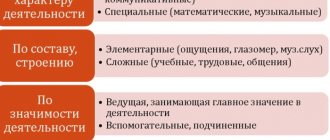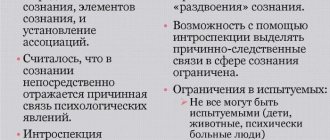The universe is full of unexplored and unusual things. It functions according to its own laws and often defies rationality and logic. Using exclusively accurate knowledge, we do not know much of what was previously shrouded in mystery. And at the moment when a person is faced with something that he does not understand, abstract thinking comes into force - what is it in psychology in simple words, as well as examples from life, I will give below.
Definition of the concept
The ability to think helps an individual find a way out of the current situation and form his own view of the world. But this ability comes in several varieties:
- Accurate – there is knowledge, information and a clear understanding of what is happening.
- Generalized – there is no data, and a person can only assume and guess.
Abstraction belongs to the second type. In scientific terms, this is a type of cognitive activity when general reasoning occurs without taking into account specific details. This makes it possible to consider what happened from different angles and find various methods for resolving it.
Of course, this doesn't always happen. Let's imagine that a man is lying on the bed and scrolling through his feed on a social network. The first thing that comes to mind is “He’s lazy.” We will most likely draw this conclusion based on what we see. But in fact, something else could have happened. He lay down to rest for 10 minutes after a hard day at work. He was ill and therefore unable to attend to his business. There are many options, and if we move away from the specifics and look at everything from different angles, we can understand and learn a lot of new things.
Abstract thoughts have approximate meaning. There is no room for specific information, and phrases such as “in general” and “maybe” are used throughout the process.
Signs
There are signs by which one can determine that this type of thinking predominates:
- The need to build cause-and-effect relationships;
- Clear systematization of the information received;
- In communication, the use of formulas, calculations, and any conclusions predominates; hypotheses are put forward, and skillful manipulation of words is also noted.
- High ability to summarize and analyze
- The ability to argue your opinion, justifying it logically
If the above signs are not your strong point, do not despair, because it is easy to fix, you just need to be patient, because this is a long process, but very necessary. Because with the help of abstractions and logic, we can find our truth by questioning certain information. Quickly build a chain of certain conclusions and possible solutions to problems. A person becomes able to quickly make a decision and rely on his experience without devaluing or ignoring it. And who doesn’t want to calculate options for events in advance, anticipating them?
Essence and benefits
So, the ability to think helps a person build his own views on the world around him, cope with life’s difficulties, and achieve goals. But in most cases we use the exact variety, operating with detailed data.
When we see a guy sitting on a bench and cracking sunflower seeds, it seems to us that he is a slacker. That is, we think based on the specifics that are in front of us. But we can do this more generally, and then we will learn much more.
Stepping away from the facts and assuming context, we understand that perhaps the young man had a fight with his girlfriend, and before that he had given up smoking and therefore replaces the cigarette in a similar way. Or today he has a free day and he decided to relax and get some fresh air. Abstract thinking gives us room for imagination, to look at what is happening from different points of view and to learn a lot of interesting things.
This method is especially useful in specific everyday events when a person finds himself in an intellectual dead end. That is, she finds it difficult to find a solution to a problem or develop an objective view. But abstraction allows you to notice what was not so obvious before.
Why do you need to develop logic?
How to develop thinking?
Every person has it to one degree or another. But for a better understanding of reality and the ability to operate with it, logical thinking, developed at a fairly high level, is necessary. This can only be learned through training. Creative thinking can be developed and negative thinking can be eliminated. The brain is trained no less than the muscles, perhaps more. By constantly training thinking and memory, a person can develop throughout his life, methodically improving his performance. The development of intellectual abilities is a guarantee of effective self-improvement.
It is commonly believed that creative thinking is opposed to logic and reason, but this is a false statement. Creative perception of reality is fundamental to creativity. This does not at all mean the need for negative thinking, which is characterized by focusing exclusively on the bad. On the contrary, it allows you to train your brain, clear it of stereotypes and interfering attitudes, and look at everything from the outside. This is how perfect horizons open up. As a result, the ability to solve problems in a non-standard way, to find previously impossible ways.
Abstract-logical type of thinking
In this case, abstractions are used - these are individual units of precise patterns. They are distinguished from the abstract properties of an object, that is, those that cannot be seen with your own eyes, touched or felt.
A fairly clear example is mathematics, where scientists try to explain phenomena that do not occur in nature in material form. There is no such thing as the number 3. You and I understand that these are three absolutely identical units, and the name was developed to simplify it.
As people evolved, they began to use terms that essentially did not exist. For example, language is a set of sounds, letters and words. But you can’t touch them, and the alphabet itself was invented only so that we could formulate our own thoughts, transmit and receive information. This allowed individuals to communicate with each other.
Psychologist Daria Milai
Make an appointment
An abstract-logical thought process is necessary in the presence of some certainty or, as mentioned above, a dead end. When something that exists in reality is revealed, there is a need to give an explanation for it.
Practice SWOT Analysis
SWOT is an assessment of the Strengths and Weaknesses, as well as the Opportunities and Threats of anything: an idea, a proposal, an object.
It’s easier to explain how this is done with an example. Let's say you're thinking about going out to fast food for dinner. Strengths: fast, cheap, tasty. Weak: harmful, high in calories. Opportunities: no need to prepare, free up time to learn programming. Threats: you can get poisoned or simply overeat, and you won’t want to do anything anymore. You can also analyze the option “write code now” or “take on another freelance job.” And make a rational choice.
Types of Abstractions
To understand what abstract thinking means, it is worth understanding the units of patterns, their varieties and purposes. There are only six of them:
- Isolating – helps highlight those elements that are emphasized.
- Constructivization – expresses “blurry” objects in a clearer form.
- Actual infinity – establishes infinite components as finite.
- Generalizing – cuts off the personal characteristics of the object and concentrates on its general characteristics.
- Primitive-sensual - highlights some properties and traits and avoids others.
- Idealizing - changes the real description to an ideal template that hides all the shortcomings.
In addition, there is a classification by task:
- Formal - phenomena are considered through specific external manifestations, without which they would not exist.
- Substantive – elements that can exist independently are highlighted.
Using all abstractions and the possibilities they present, a person isolates from reality what he physically cannot see, hear or feel. But the generalized patterns of what is happening are conveyed to us through speech by parents, teachers or educators. With this wealth of knowledge, we do not have to explain already known truths every time they happen. But here it is worth mentioning the other side of the issue.
Methods for checking the degree of development of cognitive abilities
Checking the degree of development of abstract thinking does not present much difficulty. Psychologists also deal with it. How exactly can abilities be explored? The following group of tests is used:
- The standard test for abstract thinking is the Eysenck test. Allows you to explore intellectual capabilities. Additionally, other tests may be used, depending on the situation.
- The abstract-verbal style of thinking can be assessed based on the results of a conversation with a person. Additionally, a situation or topic may be presented, on which the subject must draw conclusions. This will provide more information than a simple oral interview.
- It is possible to use special logical tasks. They allow you to study the speed of abstract thinking, its quality, direction, and the ability to quickly switch from task to task, from process to process.
A person can check himself. However, it is better when an experienced psychologist is involved in the case.
Forms of abstract thinking
During the thought process, the individual has at his disposal a mass of various information, as well as the experience he received during development in this matter. As already noted, there are a huge number of phenomena in the world that are not subject to the human organs of vision, hearing and touch (and some of them are not at all). But since they are present in our lives and we know about them, they must have a certain structure. I will describe the types of thoughts.
Judgment
It is used when there is a need for confirmation and denial. It is divided into simple and complex. Here is the first type - “the dog barks.” It is expressed specifically and has only one meaning. But here’s a more complicated thought: “The child is crying because he wasn’t given candy.” It consists of several narrative structures.
Face-to-face consultation
What are the features and advantages of face-to-face consultation?
Find out more
Skype consultation
What are the features and benefits of Skype consultations?
Find out more
In addition, reasoning can be true or false. True ones allow us to consider the real picture and, as a rule, they lack a subjective assessment of what happened. And the latter become incorrect in the case when a person shows his interest in this subject and begins to rely on personal preferences and views, and not on what is really happening.
Inference
It is formulated using 2 or more judgments. That is, in fact, this is a more complex consideration. It includes a premise (initial reasoning), a conclusion and a conclusion. And all this is achieved in a logical way. Let’s give an example: “All women are beautiful. Masha is a female representative. So she's beautiful." From the two premises we created a new hypothesis.
Concept
This is a thought that conveys a generalized property of different objects. Their characteristics can be anything. But a prerequisite is their similarity. After all, this is the only way to combine them into one category.
I will describe a word like “car”. It comes in passenger cars, trucks, and hatchbacks. All cars have different colors, functions and shapes. But the presence of wheels, seats, and an engine allows us to call all the options in one word.
People learn this skill from a very early age. When a mother says “dog” to a child, the child immediately imagines a barking animal with four legs, ears and a tail. But they come in different breeds, colors, etc. But the unifying characteristics make it possible to include all dogs under this concept.
How to check the degree of development of logical thinking
Psychologists diagnose logical thinking. In some cases, teachers can assess skills and the degree of maturity of intellectual activity. Determining the level is quite difficult. Because errors are possible. A discount is made on the new conditions in which the test subject is located, on the complexity of the didactic material and other factors. Because not all forms of logic are equally developed in one person. Especially if he did not undergo special training and did not train. The average indicators are recorded in writing in order to compare the initial and final results after a certain development.
The tasks and assignments are selected by a psychologist. Usually, for testing purposes, it is enough to selectively compile material from Eysenck questionnaires and similar ones. Also included are questions from the Wonderlica questionnaire (Vanderlik), processed in Russian.
The task is to examine the extent to which the subject is able to use the tools of formal logic. Without special training, it is used chaotically, without a system.
Psychologists use logical tasks as effective material. There are many of them on the Internet, but not many check the actual logic. Therefore, it is better to treat the material on the sites with a sufficient degree of skepticism.
Conversations show good results. In the course of the subject’s reasoning, inaccuracies, harmony of statements and arguments, features of movement and trajectories of thoughts are already visible. Not all psychologists are competent enough to immediately talk and evaluate the reasoning of their patients. Therefore, out of necessity, they attract specialists who are familiar with formal logic and freely use its methods in practice.
In some cases, it is advisable to use text materials, simple journalistic articles, and popular science texts. This will allow you to evaluate the degree of effectiveness of working with what you have written.
Psychologists have many more methods at their disposal. For example, visual material on cards. The patient is provided with a series of picture cards as stimulus material. They depict situations. The task is to arrange the displayed events in exact sequence. Then tell the story that turned out.
The examination may take a lot of time. Depends on what aspects of logical thinking the specialist evaluates. On average, diagnosis takes from 60 to 180 minutes. Plus or minus.
Logical thinking tests are also carried out as part of the identification of mental disorders. But here it is enough to limit ourselves to the “exclude the unnecessary” techniques and working with cards. As described above. In patients with schizophrenia and psychosis, a split in the processes of intellectual activity is observed. Therefore, they are not capable of even basic logical thinking. Disturbances in logical thinking also occur in healthy people. But not in such a rude manner. They are rather inaccurate in nature. But in general, the nature of the reasoning is correct.
If a person does not have the opportunity to contact a psychologist, you can test yourself. For this, resources with Eysenck and Wonderlick tests will come to the rescue. It is not necessary to undergo diagnostics often. Selective development of certain aspects of intellectual activity is possible. It turns out that the tasks are solved without problems, but in other situations the subject is helpless or is at the same level as he was. The information content of such self-diagnosis is minimal.
Examples of how to think abstractly
One of the brightest, perhaps, are the exact scientific fields: mathematics, chemistry, geometry, physics. Such reflections are called fundamental to them. Scientists do not see or feel numbers, figures and chemical elements as such, but they know how to operate with them: count, measure, combine.
Or take the concept of “life”. What it is? Many philosophers have sought the answer to this question. Essentially, this is the existence of a body where consciousness is placed. But we still won’t be able to say clearly about this concept.
This type also occurs when a person thinks about the future. We will never know for sure what will happen to us tomorrow, in a month or a year. But we tend to make plans, dream or set goals and go towards achieving them. Human activity has a certain direction. We are unlikely to be able to change some things, but such thinking helps us develop a strategy and go towards what we want. In other words, this reality does not yet exist, but we are trying to do everything so that it is in accordance with our ideas.
It is impossible not to mention such a property as idealization. Many people imagine reality and the individuals living in it as ideal. A well-known stereotype is to wait for the “prince.”
It is worth touching on examples of deceptive judgments. The first thing that comes to mind again concerns the topic of relationships. Some female representatives confidently claim that all guys are bad.
But such a conclusion is based solely on subjective opinion. If a girl is unlucky with her chosen one, and he offended or deceived her, this does not mean that everyone is like that. But in this case, men are spoken of as a specific category with their own characteristics, and therefore the traits that one of them has are attributed to all.
There are many similar examples, but they all prove that abstract thinking is of great importance in our everyday thought process. Of course, each person manifests it differently and there will always be something that needs to be developed. And if you don’t know where to start, then I will help you take the first steps in self-improvement; to do this, you just need to sign up for my personal consultation.
How to learn to abstract yourself
Anyone can abstract, often this happens unconsciously, as a defensive reaction from the surrounding reality. Learning to do this is useful to maintain composure, control thoughts and isolate yourself from the negativity of social life. Abstraction will help you ignore negative manifestations; an example of this is the memory of a pleasant evening or childhood years.
From society
To abstract yourself from society, you need to concentrate on positive moments, learn to rest, and relax. It is important to clearly formulate thoughts and goals; this will help you understand your role in society and concentrate at the right time. This is facilitated by planning the day, drawing up plans, and the ability to prioritize goals. If, for example, noise interferes with concentration, you need to imagine it as a background that will not stop without concentrating on it. Then the brain will stop paying attention to the noise. Slow breathing on a count will help you to disengage. You need to relax and count to ten.
It will never be possible to isolate yourself from society and crowds; it is impossible to avoid crowded places. A negative reaction will be reduced by a proper daily routine and good nutrition. Imagination will help you transport yourself to a pleasant place.
Note! Thought processes suppress negative emotions. Stress and lack of sleep contribute to impaired abstract thinking.
Abstraction
From a person
To abstract yourself from a person, you need to not concentrate on the negative. If emotions take over, take a break. For example, stop communicating for a while. Distraction will help you switch to something positive.
You need to concentrate on the positive qualities of a person, paying a lot of attention to them. Remember what happened more in life related to him: good or bad. Focusing solely on the negative only hurts the relationship. Abstraction is the ability to sweep away the unnecessary.
From unpleasant people
When communicating with people does not bring pleasure, but you cannot stop it, you need to learn to abstract yourself. To do this, it is important to understand what exactly leads to negative emotions, identify the problem and begin to fight it. Communication and conversation with unpleasant people can help correct the situation. A calm dialogue in which the problem is voiced will get rid of the irritating factor.
From the situation
Looking at it from the outside will help you abstract yourself from the situation, as if it were happening to another person. Emotions become dull, the mind becomes clear, and solving the problem becomes much easier. You can imagine that this is a film and you need to figure out what the main characters should do to get rid of the negativity.
In any situation, you need to notice only what is important, filtering out unnecessary details. Perhaps they are what lead to irritation. Understanding that this is not worth attention will help you calm down and cope with negativity.
Abstract thinking helps you survive and become happy in the modern world. After all, there is not always an exact plan, and it is impossible to have all the knowledge. An abstract person is able to come to conclusions by analyzing available facts. The main thing is to be able to build logical chains and use your imagination. It is abstraction that helps a person draw conclusions and make decisions.
Why is it necessary to develop these skills?
This type begins to develop in a child from an early age. Every child loved to fantasize and daydream as a child, imagining things that are unlikely to happen. This is the very thinking when we abstracted from reality.
Ask a question
At school, this skill contributed to the study of exact fields of science (the same geometry). At university, the ability was also useful in solving numerous abstract problems. And finally, at work we distribute responsibilities, group them according to specific characteristics, cope with difficulties and often even find some connection between them. We do the same thing when we think about the meaning of our own lives.
There are quite a few areas where this property plays a major role. This is a philosophical teaching, and writing, and psychology. Another advantage is that we can dream, plan for the future, talk about religion or joke. And this list can be continued endlessly.
Such reflections allow us to remain developed and intelligent. We see what formally does not exist, and we know how to study the phenomena of reality. Therefore, the importance of this improvement cannot be overestimated - this is how we increase intelligence, achieve success both at work and in personal life, and use simple methods for this.
Development
Here are a few exercises to help improve your skills. But they may change for different ages, so we will consider them separately.
In children
During this period, such thinking progresses automatically. But parents have the power to create more favorable conditions. It is advisable to start training from the first years of a baby’s life, since at this time his brain is just beginning to form and grow. The main goal at this stage is to broaden your horizons as much as possible.
Here's what you can do for this:
- Spread paint on a piece of paper to make a stain. Make a picture out of it with your child. Give him room for imagination and let him voice his own idea.
- Come up with words or names together. For example, choose an illustration and give it some unusual names. It can be anything: nature, flora and fauna.
- Take up home theater performances. Together with your child, create costumes from scrap items and various props, arrange rehearsals, and improvise. Shadow theater is also quite effective.
At the same time, solve puzzles and all sorts of puzzles. Teach your child the rules of playing chess or checkers, and assemble a mosaic. Most likely, the first steps in this matter will not be easy, but in the future the thought process will progress much faster.
In adults
In this case, abstract-logical thinking is improved in more complex ways than in childhood. But it still remains possible. The reason is that this skill has already been formed, and knowledge is much more difficult to comprehend. But you can do exercises to increase your creativity:
- Lie down comfortably and close your eyes. Your task is to clearly and in detail imagine all the people with whom you communicated that day. Scroll in your head what they were wearing, their voice, gestures and facial expressions. At the same time, think about your feelings and sensations received during communication.
- Now start imagining different emotions: sadness, happiness, anxiety, sympathy. At the same time, do not assign them to a specific object, but create an imaginary image for each state.
- Then come up with silhouettes of intangible phenomena or terms. Observe your own associations, track the symbols that arise.
In addition, you can take up drawing, solve the same puzzles, or read thematic literature.









